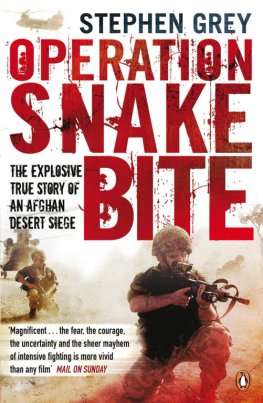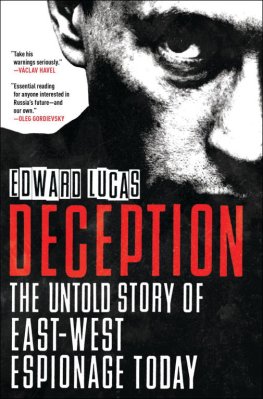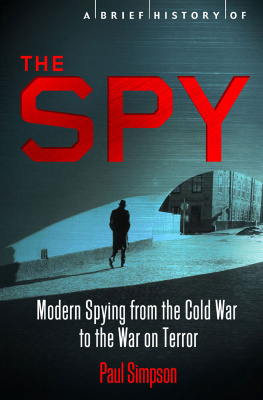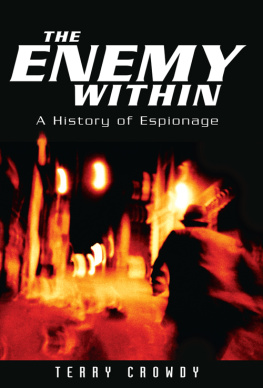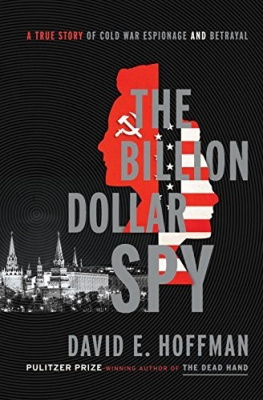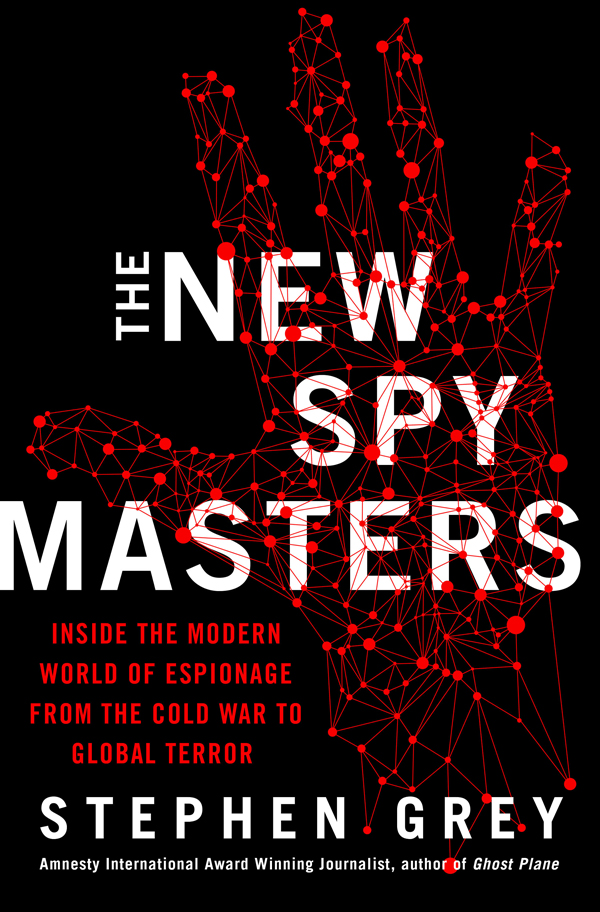Contents
Guide

The author and publisher have provided this e-book to you for your personal use only. You may not make this e-book publicly available in any way. Copyright infringement is against the law. If you believe the copy of this e-book you are reading infringes on the authors copyright, please notify the publisher at: us.macmillanusa.com/piracy.
To Sophie and Daniel
Modern spying terms
Analyst Someone employed to examine secret and open-source intelligence and draw conclusions.
Betrayal In order to gather human intelligence, a spy must inevitably betray someone.
Case officer An employee of an intelligence service who recruits and manages secret agents. Such operatives typically object to being called spies, since it may imply betrayal.
Clandestine action Secret political or military action abroad.
Cover or legend The fictional identity, biography and/or purpose of an intelligence officer or secret agent, created to allow them access to certain individuals or places.
Covert action Political or military action by a secret service, the sponsoring country of which remains hidden and unacknowledged.
Dangle A walk-in ( see below ) sent to a secret service by an enemy as a plant or double agent in order to provide false information or otherwise cause damage.
Dead drop A pick-up place for an agent to leave secret intelligence he has stolen.
Debriefing Questioning a source, agent or captive; can also be a euphemism for harsh interrogation.
Diplomatic cover Most intelligence officers travel abroad under cover as diplomats. This provides them with immunity from being prosecuted for spying.
Double agent A secret agent working for one master who is persuaded to work for another too.
False flag A trick used by a secret service to make a secret agent think he is being recruited by another countrys service.
Handler The term for a case officer who manages or runs a secret agent. Keeping the agent alive and sober is hard.
HUMINT Intelligence from all kinds of human sources including spies and ordinary contacts. This may also include intelligence from debriefings and interrogations.
Illegal The exception: an intelligence officer who works without diplomatic cover and carries out spying. In the US, illegals are known as NOCs: Non-Official Covers.
Informer Someone who provides tip-offs to secret services or a law enforcement agency, but who may not be under their active control.
Intelligence officer A staff employee of a secret service. He may, among other roles, be a case officer or analyst.
Laws are to be obeyed at home and broken abroad. Spying is illegal in every country of the world, even for diplomats.
Requirement (also known as tasking) Instructions from a secret services political masters to collect specific intelligence on a target or subject.
Secret intelligence Vital information that is kept secret: i.e. is protected in some way. Protected government information is usually marked as such: e.g. labelled Top Secret, NOFORN (i.e. no foreign national) or Official.
Secret intelligence service A government agency whose function is to gather intelligence and carry out secret tasks, whether recruiting spies, gathering SIGINT ( see below ), analysing secret intelligence or carrying out covert and/or clandestine actions.
Secret police A secret service that identifies, watches and may secretly arrest and interrogate alleged enemies of the state. (A security service like MI5, with no power of arrest, is not in this sense a secret police.)
SIGINT Signals intelligence: i.e. intercepting electronic signals, including from communications systems, radar and weapons systems. The great seductive rival of human intelligence.
Spy or Secret agent Any person who steals secret intelligence and then passes it on to a government agency, in their own country or abroad.
Sub-agent or Sub-source An agent working for another agent, providing hearsay intelligence.
Targeter An analyst who locates targets for assassination or capture.
Triple agent A double agent who is re-doubled to betray his new master and work for his original master.
Walk-in A volunteer for a spy agency who may literally walk into an embassy or contact the secret services by email, telephone, letter or some other means.
Secret agencies and their role
United States
Central Intelligence Agency (CIA) Includes both a clandestine service (the National Clandestine Service), which handles spy operations, and a larger intelligence division, which analyses the product from multiple sources of intelligence, including open sources. The main CIA customer is the US president, who must also authorize its covert actions.
Defense Intelligence Agency (DIA) Part of the Department of Defense; similar in structure to the CIA, with a clandestine service and with analytical and science and technology directorates, all providing military-related intelligence.
Federal Bureau of Investigation (FBI) Self-tasking agency which functions generally as a federal police but has counterintelligence, counterterrorism and national security divisions that carry out domestic secret intelligence work: e.g. running spies inside violent extremist groups. Also responsible for investigating any crimes against US persons or interests abroad.
National Security Agency (NSA) Huge agency that collects SIGINT globally.
United Kingdom
Defence Intelligence (DI) Similar to the American DIA; provides all-source intelligence and analysis of a primarily defence and strategic nature.
Government Communications Headquarters (GCHQ) British equivalent of the American NSA; single-source agency with a focus on SIGINT.
Joint Intelligence Committee (JIC) The main customer and coordinator for UK intelligence. It provides intelligence assessments, covering all sources, and sets requirements for SIS and GCHQ.
Secret Intelligence Service (SIS) Also known popularly as MI6 (a cover-name that was used in the 1930s and the Second World War); the foreign intelligence service and the rough equivalent of the CIAs clandestine service; single-source (HUMINT) agency. Analysis is mainly handled by other departments in the British government, including the JIC and DI. All significant operations require ministerial approval.
Security Service (MI5) Domestic intelligence service. It is still referred to generally by its designation in the First World War, MI5, and called the BSS (British Security Service) by US agencies. It carries out secret security work, targeting violent extremist threats (mainly terrorism) to the UK. It runs agents and interrogates sources, but, unlike a police force, has no power of arrest. MI5 is self-tasking.
France
Direction Gnrale de la Scurit Extrieure (DGSE) Foreign intelligence service.
Direction Gnrale de la Scurit Intrieure (DGSI) Internal intelligence service, created in May 2014 and replacing the Direction Centrale du Renseignement Intrieur (DCRI), itself the result of a merger in July 2008 of the Direction de la Surveillance du Territoire (DST), the former domestic intelligence service, and the Renseignements Gnraux (RG), the former police intelligence service.
Germany
Bundesamt fr Verfassungsschutz (BfV) Domestic intelligence service, which, due to memories of the Nazi-era Gestapo, operates at a state level only and with restricted powers.
Bundesnachrichtendienst (BND) Foreign intelligence service of modern federal Germany.


